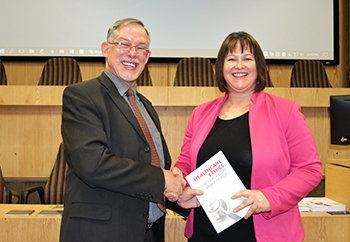Latest News Archive
Please select Category, Year, and then Month to display items
12 January 2024
|
Story Nonsindiswe Qwabe
|
Photo Sonia Small
 Since joining the UFS in 2008, Dr Grey Magaiza has worked extensively on approaches that can foster the socio-economic transformation of societies.
Since joining the UFS in 2008, Dr Grey Magaiza has worked extensively on approaches that can foster the socio-economic transformation of societies.
“The future should be one where communities can decide on their development agenda and futures. That’s the most important for me.” Dr Grey Magaiza, Deputy Director of the Centre for Gender and Africa Studies (CGAS) and Head of the Community Development programme on the Qwaqwa Campus, is passionate about capacitating communities to be agents of change and advancement. His vision for the future emphasises the empowerment of communities to take charge of their development by actively participating in decision making and the implementation of development projects that can improve their lives.
Since joining the UFS in 2008, Dr Magaiza has worked extensively on approaches that can foster the socio-economic transformation of societies. Over the years, he has crafted his research speciality into one that he is most proud of – being an interdisciplinary scientist immersed in the development of communities.
“I’m in a fortunate position of researching what I like. I say ‘fortunate’, because I’ve taken the time to understand what I’m passionate about, which is the overall field of rural livelihoods and livelihood futures – in short, community development. My research starts from an engaged university, understanding the elements that a university must use to enhance transformation and relevance to its immediate community in terms of development.”
One of the ways he has done this is by looking at social entrepreneurship as a development approach for young people in a rural setting. Through workshops with non-profit and civic organisations in Qwaqwa, Dr Magaiza has been helping these organisations to map out their needs and actively meet them through the involvement and support of external role players.
“We understand that communities are part of the national development agenda, but even that national agenda respects community knowledge and intentions and allows communities to shape their identity. A critical enabler of this is community organising. You bring back the capacity in communities to have dialogues on issues affecting them as spaces for engagement, knowledge exchange, and for people to just talk about their way forward.”
By enabling communities to define their development agenda, they can address their specific needs, challenges, and aspirations, he said. “When I look at livelihood futures, it’s quite an exciting aspect of my work – it’s like looking into a fortune tellers’ globe, because you’re not deciding for communities what they should do, but the communities themselves take those decisions.”
Ethics at the heart of healthcare practice
2017-05-17

Prof Gert van Zyl during the launch of Health
Ethics for Healthcare Practitioners with
Prof Laetus Lategan at the Central
University of Technology.
Photo: Supplied
The Central University of Technology (CUT) in partnership with the University of the Free State (UFS) launched a newly published book: Health Ethics for Healthcare Practitioners that aims to raise awareness among healthcare practitioners and patients about various unethical challenges faced by healthcare services in both the private and public sectors.
Prof Laetus Lategan, Director of Research Development and Postgraduate Studies at CUT, and Prof Gert van Zyl, Dean of the UFS Faculty of Health Sciences, are the co-editors of the book intended to provide a moral guide to healthcare professionals when dealing with their patients.
Holistic approach to healthcare practice
Their work places renewed emphasis on the importance of healthcare ethics. This is due to a diversifying range of healthcare services and the imminent collapse of the public healthcare service sector; most notably in developing countries. The authors particularly focus on how their findings can be integrated into real-life situations.
The book looks at modern-day healthcare ethics and how they apply to both patients and healthcare practitioners including doctors, professional nurses and therapists. It is an elaborate reference book that will help healthcare practitioners to make informed decisions should they be faced with ethical dilemmas in their practices and assist them to gain a better understanding and devise solutions to problems faced by communities.
Academic journey and partnerships forged
Prof Van Zyl said the book had been a joyful journey of collaboration between the two universities, a journey of academic colleagues who become friends. He explained that they wanted to focus on creating new approaches to healthcare from an ethical perspective, to provide a guide and reference on ethics, not only to healthcare practitioners, but also to patients. “We hope this book will make a difference in healthcare delivery,” he concluded.
Prof Lategan said modern science needed to become more interdisciplinary, which would transcend the way science was conceived. “The essence of healthcare is to be of service to other people and have relationships with other people. I think it’s high time for us to start caring for one another, especially in the academic environment. If we are really looking after the health of other people, whether it is mental, spiritual or physical health, it starts with caring for other people.”